
The Business of Fashion
Agenda-setting intelligence, analysis and advice for the global fashion community.

Agenda-setting intelligence, analysis and advice for the global fashion community.
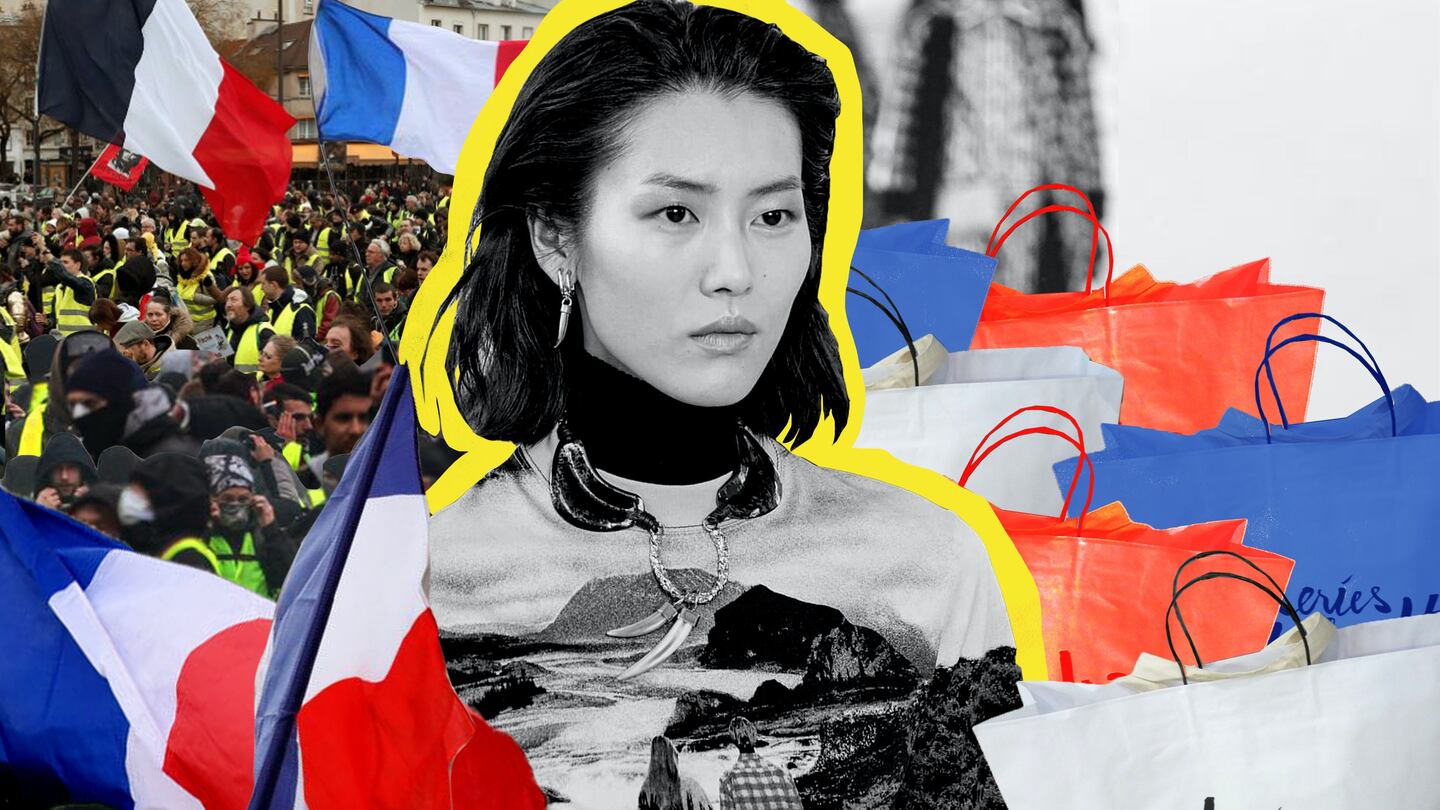
Hello BoF Professionals, welcome to our latest members-only briefing. China’s colossal size and dynamism makes it a top priority for any global business, but it remains opaque to many in the fashion industry. Leveraging our rare access and local knowledge, the BoF China team demystifies the Chinese market with weekly industry analysis and the wider socio-cultural context you need to sharpen your focus.
PARIS, France — It's one of the most iconic garments of the season, yet one that Chinese shoppers have actively avoided.
Yellow vests were worn by the eponymous French protestors who kept many tourists out of the country during the crucial retail period from Christmas to Chinese New Year.
By last weekend, however, protestors in France had dwindled to a new low of 28,600 from almost 300,000 in November. And word is getting back to China. With the apparently weakening of the “gilets jaunes” movement and the Chinese yuan strengthening, a new report from HSBC predicts Chinese luxury shoppers will return to Paris.
ADVERTISEMENT

The Champs Élysées the day after demonstrations on November 25 | Source: Shutterstock
“In our multiple surveys, security issues are the top element Chinese consumers look at when choosing a destination,” said Erwan Rambourg, global co-head of consumer and retail research at HSBC. “[And] many corporates mentioned that the [protest] movement will have weighed on sales to tourists in Europe over Q4.”
But the outlook is improving for French retailers, he says. “Theoretically, given the waning intensity of the [protest] movement and stronger purchasing power, Chinese tourism flows should revert.”
Beijinger Belle Zhao visited the French capital in February, despite her mother’s concerns for her safety. At Le Bon Marché, Galeries Lafayette, off-price outlets and even in the queue for tax refunds, she said, “There really weren’t many Chinese people.”
“People heard the news and didn’t want to go, but it wasn’t what we imagined,” Zhao said. “I didn’t see any violence.”
That message is getting back to consumers in China. During Paris Fashion Week, many Chinese celebrities and fashion bloggers attended “and didn’t mention the yellow vests and insecurities in Paris,” said Sophia Dumenil, one half of Paris-based luxury consultancy The Chinese Pulse.
Given the waning intensity of the [protest] movement and stronger purchasing power, Chinese tourism flows should revert.
According to research from the China Tourism Institute and Ctrip, France plummeted from Chinese tourists’ most popular European travel destination in 2017 to their fifth most popular in 2018. International flight arrivals dropped between 5 and 10 percent in December, and “January and February 2019 were still slow,” said Juliette Duveau, Dumenil’s partner at The Chinese Pulse.
But, they said, “Chinese people who are based in Paris explained the real situation, which was not that serious or terrible.” They noted that French state tourism agency Atout France was predicting renewed tourist growth in March.
ADVERTISEMENT
As the city’s security situation normalises, lower prices on luxury goods should add to the appeal of what has historically been one of Chinese travellers’ favourite luxury shopping destinations.
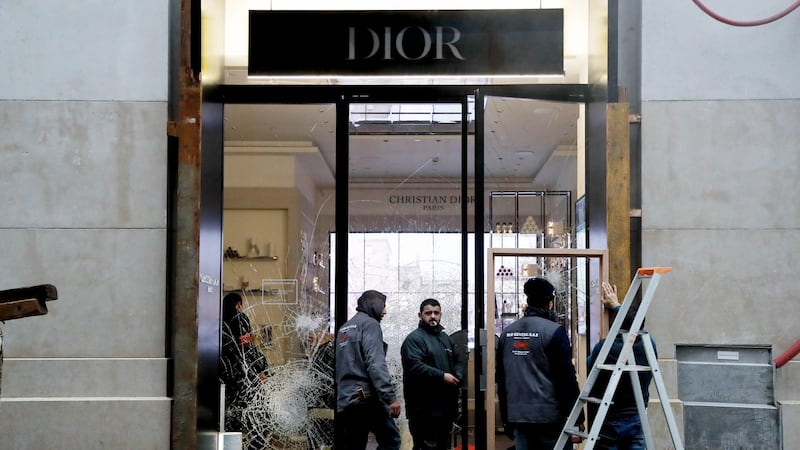
Workers repair the Dior shop window on the Champs-Elysees avenue in Paris after a rally by yellow vest protestors | Source: Getty Images
Chinese consumers tend to shop across markets when buying luxury goods, relying on family, friends and co-workers to bring them back when they aren’t themselves travelling. That, in part, prompted brands to begin reconciling global prices that had diverged by as much as 40 percent when HSBC began charting them in their Luxury Pricing Barometer report in 2015.
In recent months, some of that work has been undone by shifting currency exchange rates. With the yuan rising 4 percent against the euro since September, HSBC found that purchasing luxury goods in France is on average 27 percent cheaper than buying them in China, up from 22 percent in September.
HSBC assessed 40 different luxury garments and accessories in comparing global prices for their report. Unsurprisingly, prices for luxury items in China were higher across the board. Rambourg attributes this to import duties, shipping costs, and the willingness of Asian consumers to pay up. Ultimately, however, he said, “all three factors are structurally bound to come down, and price transparency is everywhere.”
The biggest mark-ups HSBC found were for a Michael Kors bag, which cost 81 percent more in China, followed by Moncler jackets, which cost 48 percent more. The best price matching was accomplished by jewellery brands Tiffany & Co. and Cartier, whose items cost just 1 percent and 2 percent more in China.
Rambourg notes that 'hard luxury' brands — including Chanel and others selling watches and jewellery — began efforts to fully harmonise their prices two years ago.
There was typically less pressure for fashion brands to reconcile their prices, he said, because “fashion purchases are seasonal, and price points are usually more accessible than for hard luxury, so consumers won’t shop around as much.”
ADVERTISEMENT
How safe Chinese consumers feel to cash in on these savings will depend on perception as much as reality.
Another factor that may be inflating prices in China beyond what consumers are willing to pay is its online shopping festivals. Prices for high-end beauty products, not canvassed in the HSBC report, are especially likely to come into alignment during such events, said Julien Lapka, co-founder of Shanghai-based consultancy Inner Chapter.
“With the recent [International] Women’s Day, you had loads of cosmetics and skincare brands that went on sale, making domestic purchases cheaper or on par with prices abroad,” he said.
Nevertheless, luxury fashion items remain, on average, significantly cheaper in France. How safe Chinese consumers feel to cash in on these savings will depend on perception as much as reality. The volatile security situation of the recent past still weighs heavy on the minds of many.
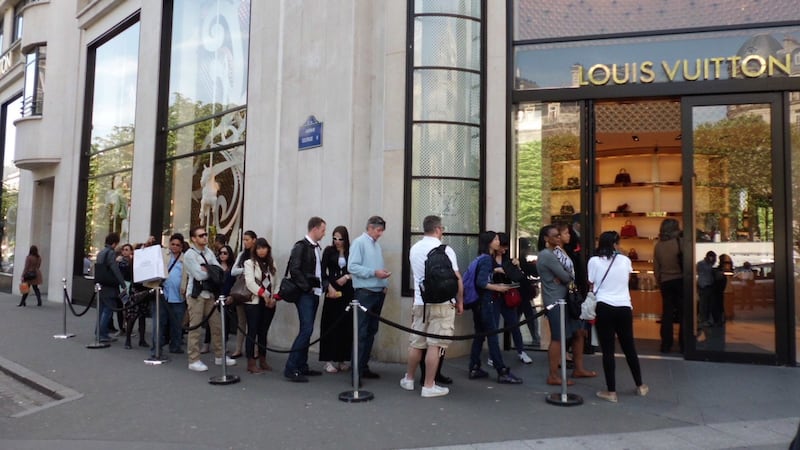
Customers line up at the Louis Vuitton store on the Champs-Élysées | Source: Flickr/Julie Corsi
In November 2015, terrorist attacks in Paris killed 129 people, including concertgoers at the Bataclan and football fans at the Stade de France. In 2016, 26 Chinese tourists were assaulted by six men while boarding a bus. And in 2017, four men targeted 40 Chinese tourists in a tear gas attack and robbery outside a hotel.
Chinese tourists are disproportionately put off by such security risks. Following the Paris terror attacks in 2015, Chinese tourists visiting France declined by 25 percent, far more than the overall drop of 6 percent.
Rambourg adds that other factors may also come into play. “For example,” he said, “the Chinese administration just announced VAT would be lowered from 16 percent to 13 percent. That will make mainland China a bit less expensive shortly.”
And if the yuan loses value against the euro, more Chinese tourists may prefer to purchase luxury items at home. Continued progress by brands to improve international price harmonisation could have the same outcome.
But for the time being, a spokesperson for Ctrip said, “France still remains a popular destination” for Chinese tourists.
“Even though the yellow jacket might have scared numerous Chinese tourists, Paris and France are still a desirable destination,” concluded Dumenil. Duveau agreed. “Their trip might have been postponed but [they] will come back.”
This is, of course, based on the assumption that there is no major inflammation of terrorist activity or protestors.
时尚与美容
FASHION & BEAUTY

Julia Restoin Roitfeld for APM Monaco | Source: APM Monaco
Fosun Rumoured to be Eyeing APM Monaco Acquisition
Following a February 21 report that jewellery brand APM Monaco is on the lookout for a buyer, people familiar with the matter have disclosed that Chinese conglomerate Fosun could be a likely candidate. Hot on the heels of its bid for German fast fashion chain Tom Tailor and the launch of the group's brand management arm, APM Monaco — which is expected to reach a valuation of $1 billion — could be Fosun's opportunity to tap into the brand's millennial audience. It could also be an opportunity for the group to redeem itself after a 13.9 percent stake in Greek jewellery and accessories maker Folli Follie proved unwise, when the brand's founders were charged with fraud and money laundering last year. (Linkshop)
Chinese Official Proposes Increasing Luxury Taxes to Curb Millennial Debt
At last week's annual "Two Sessions" meeting in Beijing, Chinese official Cui Bo proposed higher luxury tax rates as a cure for China's millennial debt problem. Cui argued that younger generations are over-spending their salaries and that higher prices on luxury goods will abate luxury consumption and restore sensible consumerism. Though a mere proposal, millennials aren't the only ones with worrying credit habits: an increasing cohort of consumers are borrowing from banks and credit unions as well as digital lending platforms to cover their purchases, and HSBC reports that the debt-to-income ratio of Chinese citizens born between 1990 and 1995 has reached a whopping 1,850 percent. (Jing Daily)
China’s Top Influencer Incubator Files For US IPO
China's leading KOL (key opinion leader) incubator Ruhan (also known as Ruhnn) is planning its US listing, according to a March 6 filing at the US Securities and Exchange Commission. Alibaba's Taobao has a 8.56 percent stake in the Hangzhou-based platform, which was founded in 2014 and is reportedly expected to raise between $100 to $200 million. At present, Ruhan — whose business model is divided between incubation, marketing and e-commerce — counts China's top fashion influencers Eve Zhang Dayi, Chonny and Dakin among its 113 KOLs, who command over 148.4 million fans in total and 91 influencer-curated e-commerce boutiques. Though many in the West are waiting for the influencer bubble to pop, Ruhan is proof that KOLs are still big money in China, and is set to be the world's first influencer incubator to list on the NASDAQ. (BoF China)
科技与创新
TECH & INNOVATION

Jackson Wang for BMW | Source: WeChat
WeChat Harnesses Celebrity Power for Ad Boost
In a bid to increase the visibility of branded ads on its WeChat super app, Tencent has begun rolling out celebrity-centred advertisements in users' "Moments" (WeChat's equivalent of Instagram stories) updates when they follow said figures on the platform. But rather than a post by celebrities themselves, users will click through to ads on related brands such as BMW, which recently launched a campaign featuring singer Jackson Wang. It seems to be working: according to Tencent, click rates on such campaigns have increased from six to ten times, and the company's investment in the wider area is paying off too — according to the company's latest third-quarter earnings report, revenues relating to Moments mini programs has increased 61 percent year-on-year. (Jing Daily)
China’s Tech Industry Nurses Its Hangover
For proof that macroeconomic headwinds have curbed China's tech thunder, ask the sector's disgruntled ex-employees. JD.com, NetEase, and Didi Chuxing are just a few of the Chinese tech giants citing "company-wide restructuring" as they cut down on staff — a trend that's likely to persist as the country's economy grows at its slowest pace in nearly three decades and venture capitalists tighten their purse strings. Although employees at China's top tech firms such as Baidu saw bonuses going up to 50 months of salary back in 2014, over half of the country's tech employees didn't receive bonuses in 2018, making tech the least generous sector for bonuses among 12 surveyed by Zhaopin. Aside from Didi's 15 percent cut in its workforce announced February, the ride-hailing giant has cut back on workplace benefits such as free refreshments, shuttle buses, and corporate gym access. (Tech in Asia)
Top Female Tech Execs Converge for Apple Roundtable
Alibaba co-founder Jack Ma once said, "men make companies bigger, but women make them better." To celebrate International Women's Day, Apple's managing director for Greater China Isabelle Ge invited CTrip's chief executive Jane Sun, Xiaohongshu co-founder Miranda Qu, 'Love and Producer' mobile game producer Meng Juan, women's community Wusi Media founder and chief executive Zhang Weixuan, and artist Ye Hongxing to a round table on female entrepreneurship. In the course of their discussions, Qu voiced that gender roles are less prominent in the country as people increasingly focus on social identity, while Sun said that women are more adept than men at multitasking. Zhang stressed that being a female entrepreneur is still subject to physiological and social constraints, and changing the social perceptions around careers and motherhood are still priorities for companies to tackle Greater China. (36Kr)
消费与零售
CONSUMER & RETAIL
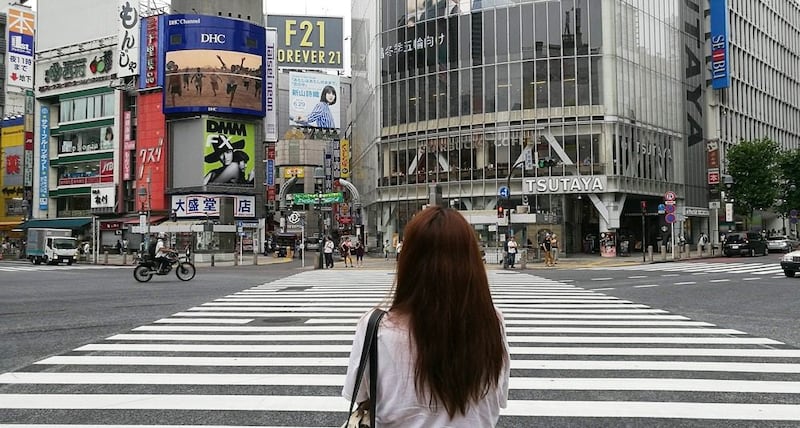
Source: Shutterstock
Japan Feels Aftershock of China’s Daigou Crackdown
By requiring daigou agents to formally register with the authorities and pay taxes, Beijing's new e-commerce law is endangering China's daigou industry where shoppers privately handle cross-border luxury imports. Since hundreds of thousands of Chinese daigou are estimated to reside in Japan, the new legislation hasn't gone unnoticed by Japanese brands or retailers. Japanese department stores' January duty free sales dropped 7.7 percent year-on-year, for the first time in over two years, while average spending per person has fallen 8.4 percent, and stalwarts J. Front Retailing, Takashimaya and Mitsukoshi Isetan recorded declining inbound tourist sales for the same period. With China's customs checks becoming stricter, even regular tourists are cutting down on shopping or hiding goods in their luggage, and Japan's slowdown in luxury good sales is likely to continue as Beijing bids to boost consumption and economic growth at home. (Nikkei)
JD.com Falling Behind in the New Retail Race
Up against the likes of Alibaba and Pinduoduo (who recently usurped JD.com's spot as China's second largest e-commerce marketplace by monthly active users), JD has been bold with its 'new retail' strategy. It poured $4.5 billion into retail-related AI research and announced plans to open over 100 automated convenience stores by the end of 2018 (as well as one million franchised mom and pop stores before 2022), but these decisions don't appear to be paying off just yet. It's estimated that JD has opened a mere dozen out of the hundred convenience stores it originally planned, and is behind on its franchising schedule as well. Considering JD's stock plunged 50 percent in 2018, it's unlikely to catch up to arch-rival Alibaba — whose omnichannel supermarket chain Hema is already leaps and bounds ahead of traditional chains — anytime soon. (Technode)
Alibaba’s Feminist “Queen’s Day” Appeal
Trust China's e-commerce behemoth to rebrand International Women's Day as a shopping festival. In line with recent efforts by brands to engage with their female consumers through feminist marketing, Alibaba has revamped the March 8 holiday — originally reserved for "fu nu," or older women and mothers — as "Queen's Day," to include younger millennial women in the dialogue. Where China's Gen-Z (born between 1995 and 2002) females frequently define their independence through financial independence, Alibaba has tapped into that sentiment by encouraging women of all ages to treat themselves on the special day. However, they're not alone, as is usually the case in China's cutthroat retail landscape: rivals JD.com and Secoo have joined the race with their respective "Butterfly Day" and "Goddess Day" campaigns. The stakes are high: Bain estimates that Gen-Z luxury shoppers will make 46 percent of purchases in the market by 2025. (Ad Age)
政治、经济、社会
POLITICS, ECONOMY, SOCIETY
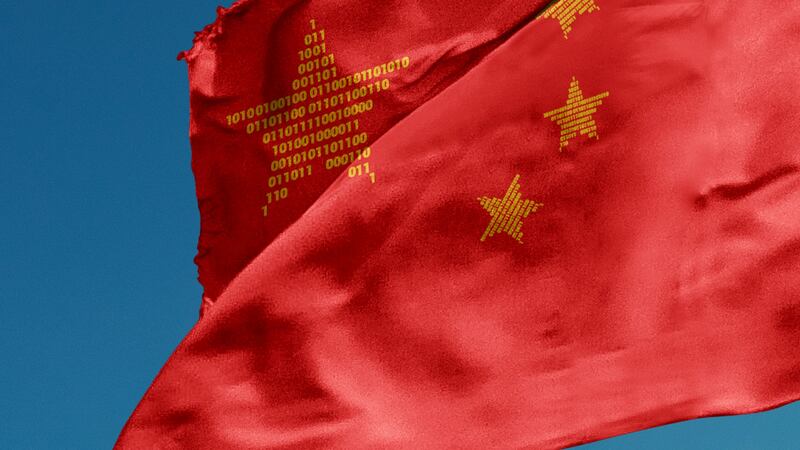
Chinese technology flag | Illustration by BoF
China’s Former Finance Minister: Beijing's Signature Initiative is a Waste of Taxpayers’ Money
According to Lou Jiwei — China's finance minister from 2013 to 2016 and acting chairman of the National Council for Social Security Fund — "a lot of talking but very little was done" on Beijing's blueprint for making China a manufacturing and tech superpower. The Made in China 2025 initiative has been controversial since its 2015 launch, and involves a web of policies and plans aimed to boost innovation in areas such as robotics, aerospace and biotech, making it a significant factor in US-China trade tensions. "Why has the government pushed so hard on this strategy? [Hi-tech industry prospects] can all change in a few years, it is too unforeseeable," said Lou, who was against the strategy from the start. More importantly, he isn't alone: for the first time in three years, the initiative wasn't mentioned at the National People's Congress last week. (SCMP)
Researcher Uncovers Sinister Chinese Database Of ‘Breed-Ready’ Women
While searching for open databases, Dutch researcher Victor Gevers found a Chinese cache listing the phone numbers, addresses and ages of over 1.8 million Chinese women, as well as their "breed-ready" status, which observers have interpreted as being of a child-rearing age. "The youngest woman with BreedReady:"1" status is 18y. The average age is a bit above 32y," Gevers tweeted on March 9, though he found that the database was taken down on Monday. Though it's unclear whether the cache served a dating app, government registry, or other company, netizens have already likened the data breach to the dystopian TV drama "The Handmaids Tale" on online forum site Douban. (The Guardian)
Italy Could Be Biggest Economy to Back Belt and Road Initiative
The Italian government is set to endorse China's global infrastructure policy in the next few weeks, reports say. Though the US, Japan and the UK have all hesitated to officially back President Xi Jinping's signature initiative, Italy's move would make it the first of G7 advanced economies to do so. Italian official Michele Geraci has said that the deal — slated to boost export volume of "Made in Italy" products in China — may be done in time for Xi's visit to the country at the end of the month. Furthermore, the deal flies in the face of warnings from the US that siding with China could damage Italy's image on the global stage, and could have wider implications in tech, as it coincides with the West's debate over the role Chinese telecom company Huawei should play in the rollout of new super fast 5G networks. (CNN)
China Decoded wants to hear from you. Send tips, suggestions, complaints and compliments to zoe.suen@businessoffashion.com.
With consumers tightening their belts in China, the battle between global fast fashion brands and local high street giants has intensified.
Investors are bracing for a steep slowdown in luxury sales when luxury companies report their first quarter results, reflecting lacklustre Chinese demand.
The French beauty giant’s two latest deals are part of a wider M&A push by global players to capture a larger slice of the China market, targeting buzzy high-end brands that offer products with distinctive Chinese elements.
Post-Covid spend by US tourists in Europe has surged past 2019 levels. Chinese travellers, by contrast, have largely favoured domestic and regional destinations like Hong Kong, Singapore and Japan.